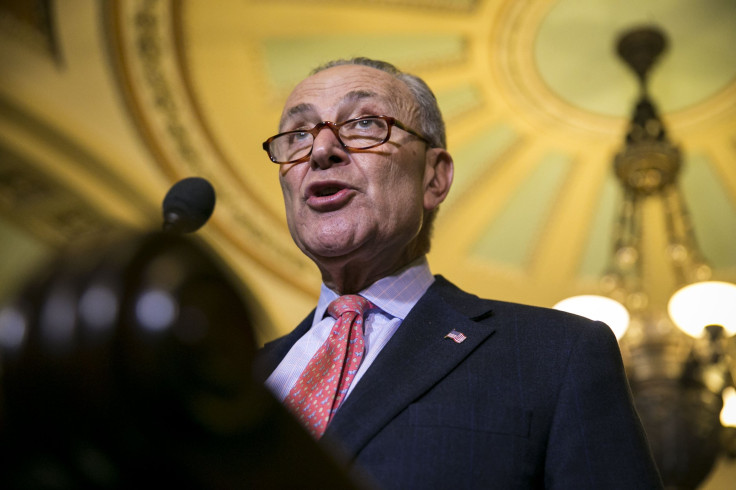Senate Passes USMCA, But With Some Prominent Holdouts

KEY POINTS
- The Senate passed by a vote of 89-10
- Chuck Schumer, Bernie Sanders and Kamala Harris voted against the trade deal
- Pat Toomey was the only Republican senator to oppose the deal
The U.S. Senate approved a new trade agreement with Mexico and Canada that the House passed in December by an overwhelming margin in a rare exhibition of bipartisan cooperation in Washington.
The vote came one day after China and U.S. signed their trade deal.
The U.S. Mexico-Canada trade deal, known as USMCA, now goes to the desk of President Donald Trump for his signature. Trump has strongly endorsed the deal and made it one of his 2016 campaign pledges. Once Trump ratifies the deal, it needs approval from Canada to take effect.
The vote in the Senate came to 89-10 in favor – only one Republican, eight Democrats and Bernie Sanders. I-Vt., opposed the deal.
In December the measure passed in the House by a 385-41 vote.
The new agreement essentially replaces the old North American Free Trade Agreement, or NAFTA, a deal which Trump repeatedly ridiculed as a “disaster” and a job-killer.
“There was a lot of momentum to get USMCA done and behind the administration before things could get really bogged down with impeachment and frankly the campaign season,” said Daniel Ujczo, a trade lawyer at Dickinson Wright, a law firm based in Detroit.
Senate Majority Leader Mitch McConnell, R-Ky., who had earlier expressed some reservations about the agreement, now said the trade deal will benefit a wide swathe of Americans. "Farmers, growers, cattlemen., manufacturers, small businesses, big businesses,” he said. "This is a major step for our whole country."
Some Democrats reportedly supported the trade deal after it upgraded the enforcement of labor standards, including the inspection of Mexican factories, as well as some improved environmental rules.
Among other things, USMCA requires that at least 40% of auto parts must be made in plants where workers earn at least $16 an hour. It also updated digital trade and copyright rules.
"This new trade deal is a modest improvement," said Sen. Elizabeth Warren, D-Mass., and a 2020 presidential candidate. "It will give some relief to our farmers. It will give some relief to our workers. I believe we accept that relief, we try to help the people who need help, and we get up the next day and fight for a better trade deal.”
Rob Portman, R-Ohio, said the deal will create many jobs, particularly in the auto industry of his state.
But there were some holdouts.
Another Democratic presidential candidate, Sen. Bernie Sanders of Vermont, who voted against the deal, earlier warned: "I will not vote for a trade agreement that does not incorporate very, very strong principles to significantly lower fossil fuel emissions in the world.”
On Wednesday, Sanders stated: “In my view, we need to rewrite this trade agreement to stop the outsourcing of American jobs, to combat climate change, to protect the environment, and stop the destructive race to the bottom.”
Sen. Kamala Harris, D.-Calif., also voted against the deal, citing it does not address climate change and “fails to meet the crises of this moment.”
Senate Minority Leader Charles Schumer, D-N.Y., also said he would not support USMCA over its failure to adequately confront climate change.
“Despite the fact that it includes very good labor provisions, I am voting against USMCA because it does not address climate change, the greatest threat facing the planet,” Schumer said in a statement before the vote took place. “Instead of advancing global climate security by outlining binding and enforceable climate commitments from all three countries, the Trump administration provides significant incentives for manufacturers to move their business and their jobs from the U.S. to Mexico, where clean air and clean water regulations are much weaker.”
Schumer added that the Trump administration “also included handouts for the oil and gas industry, such as lifting tariffs on tar sands, and refused to include any mention of the climate crisis in the agreement.”
Schumer had also voted against NAFTA and cited USMCA had many of the same provisions.
Sen. Pat Toomey, R-Pa., was the sole Republican senator to vote against the deal. He had earlier complained that changes sought by Democrats to the agreement would hurt free trade.
Some unions opposed the deal citing that its protection of labor did not go far enough.
The United Food and Commercial Workers International Union also said USMCA did not guarantee food safety by requiring strong country-of-origin labeling.
"Consumers have a right to know where their food is from, whether it’s safe, and if it’s produced by American workers," the union’s President Marc Perrone said in a statement. "Without strong country-of-origin labeling, consumers will be kept in the dark and America’s food workers will continue to face unfair competition from foreign companies not playing by the same rules."
© Copyright IBTimes 2025. All rights reserved.





















